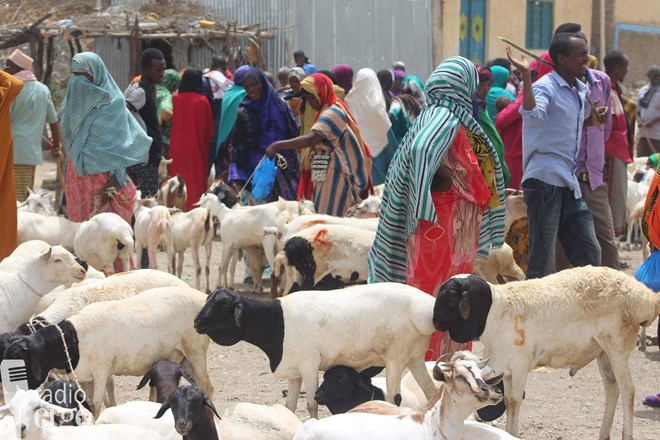
Monday September 21, 2020

(ERGO) – A new goat market in the central Somali town of Guriel has improved health and safety and trading conditions for everyone involved in the local livestock trade.
Ali Mahamud Ahmed, a 45-year-old livestock trader, sold four goats at the new market during its second week of operation. He travelled from Biyogadud, some 30 km south of Guriel, and was very pleased to see the improvements.
The old market was a gathering under a tree. The new market boasts water, toilets, restaurants, and other services and facilities. It even has a temporary detention centre to hold criminal suspects, and a veterinary shop.
“We have veterinary extension services and a shed to keep the animals that are sold and another for animals that did not sell. Animals are fed maize and kept in the pens overnight so they can be taken back to market the following day,” said Ali Mahamud, who has traded in Guriel for 20 years.Ali used to stay at a relative’s house but now there is accommodation and a mosque at the market. Pastoralists using the market pay $1 in tax and broker fees, a rise of 25 cents, to cover the services and facilities.
Overcrowding at the old market eventually forced the locals to purchase land for this new market complex, constructed by the Norwegian Refugee Council (NRC).
The market is managed by the Galmudug State Ministry of Livestock. Two ministry extension officers inspect the animals every morning and provide free treatment to any found sick. Sick animals are quarantined until they can be released with a discharge note.
The director of the ministry in Guriel district, Guled Abdi Mahamed, described the facilities.
“There are three halls, one is used as an enclosure for livestock on sale and is divided into sections, each for a maximum number of animals and separated by types. Livestock for export are kept in one place, sheep in one place, and so on, so traders have a specific place for their animals. The selling hall can hold up to 10,000 animals. There is a trading section and another area for storing animal feed,” he said.
The market has created opportunities for 12 women running small restaurants and teashops. Shukri Hirsi was allocated a small three-metre stall by the local administration, who selected among the numerous applicants for places by tossing a coin.
Shukri, 25, is the eldest in a family of five without any source of income.
“I make tea and snacks and manage to sell them as I have many customers in the market. A lot has changed, before I had no work and just stayed at home, but even if I don’t get much now at least I can get my daily bread and money for airtime,” said Shukri.
Abdikarin Sheikh Hussein Dirshe, a dealer, said he used to spend $50 hiring many herders to look after the 50 or more animals he bought in a day, but now he pays two herders $15 because of the good facilities.
“When you sell an animal, it is kept in a stall with shade and a door. There are stalls where you can feed tired animals fodder and pasture. There is storage for keeping fodder for the animals and where they can be kept overnight,” he said.
Abdi Mahamed Adan, a member of the market brokers committee, said they used to work under a tree carrying their notebooks around, but now they have an office and a lounge. What they appreciate most, however, are the facilities for keeping the livestock safe.
“In the old market, hardly a day passed without losing animals but there is nothing of the sort here. Just yesterday a man forgot about some of his livestock and this morning he found them feeding in the livestock enclosure. We used to raise money every day to pay for the lost animals, but since we came to this market, we haven’t lost a single animal,” Abdi said.